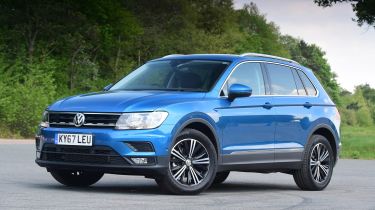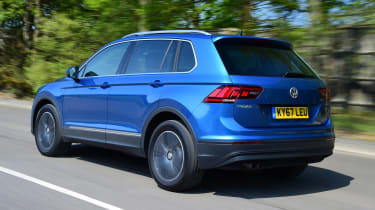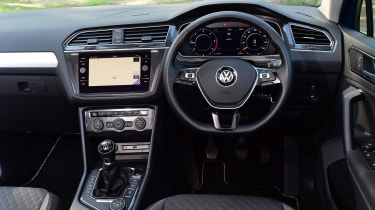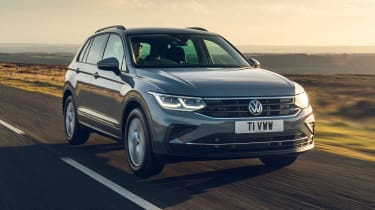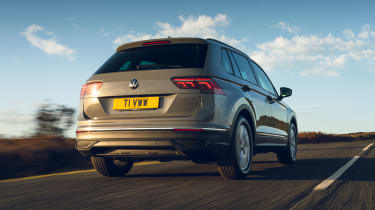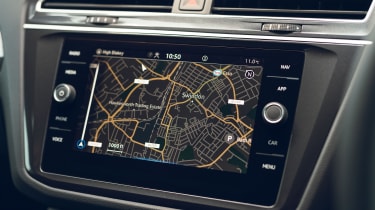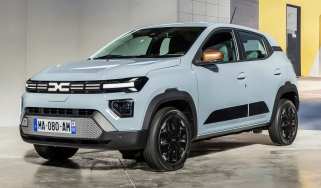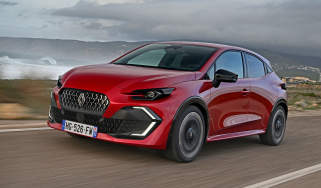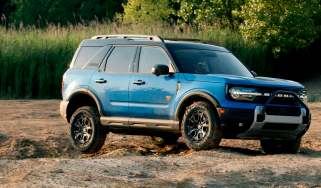Used Volkswagen Tiguan (Mk2, 2016-2024) buyer’s guide: big-selling SUV is a second-hand bargain
A full used buyer’s guide on the Volkswagen Tiguan covering the Tiguan Mk2 that was on sale between 2016 and 2024
Verdict
As the original Volkswagen Tiguan aged it became more popular, with sales increasing each year. The Mk2 followed and was a huge success, becoming the brand's biggest-selling model globally before its retirement in 2024. VW’s approach with the Tiguan was hardly revolutionary, because the compact SUV segment was already well established by the time it arrived. But what VW did – as always – was offer a well made family car that’s easy to live with, easy to drive and gives its owner the satisfaction of knowing that they have put their money in a safe place. However, some owner reviews show that problematic Tiguans do exist, and reliability isn’t a strong point in our Driver Power surveys, so faultless ownership isn’t guaranteed.
It's been over 16 years since the Volkswagen Tiguan arrived in the UK. Since then, this compact SUV has gone on to achieve great things for its maker. The second generation arrived in 2016, and a stretched seven-seat Allspace version joined the range two years later.
From the outset the Tiguan hit the spot for buyers, with its raised seating position, versatile cabin, impressive build quality, smart design and efficient engines. No wonder it proved to be such a sales success – so there are plenty to choose from if there’s a Tiguan-sized hole in your life.
History
The Tiguan Mk2 arrived in April 2016, with 148bhp 2.0 TDI diesel or 177bhp 2.0 TSI petrol engines; in July 2017 a 1.4 TSI petrol engine was added in 124bhp and 148bhp guises. The former came as front-wheel drive manual only, the latter had front or four-wheel drive, and manual or automatic options.
Used - available now

2024 Volkswagen
Tiguan
20,724 milesAutomaticDiesel2.0L
Cash £32,499
2019 Volkswagen
Tiguan
58,841 milesAutomaticDiesel2.0L
Cash £19,999
2020 Volkswagen
Tiguan
59,536 milesAutomaticDiesel2.0L
Cash £15,658
2024 Volkswagen
Tiguan
27,008 milesAutomaticPetrol1.5L
Cash £24,270The seven-seat Allspace arrived in January 2018, and is 215mm longer than the regular Tiguan to accommodate a third row of seats. Engine choices for the Allspace extended to 148bhp 1.4 TSI and 177bhp 2.0 TSI petrol units, or a 2.0 TDI with 148bhp, 187bhp or 237bhp. A 227bhp 2.0 TSI petrol engine was added to the Tiguan range in January 2019, just after the 1.4 TSI engine was replaced by 129bhp and 148bhp 1.5 TSI units. These models came in front-wheel-drive form only.
The Mk2 was replaced by the current third generation model in 2024.
Used VW Tiguan prices
Used VW Tiguan Mk2 prices for cars currently available on our Find a Car service start from £14,000 and go up to around £35,000. Use our car valuation tool to check the price of specific models.
Which one should I buy?
The entry-level 1.4 TSI 125 is fine if you’re not in a hurry, but we’d opt for at least a 148bhp 1.4 TSI because the extra muscle doesn’t impact fuel economy. If you’re towing, then go for a four-wheel-drive 4MOTION, ideally with the DSG auto for more relaxed cruising.
The entry-level Tiguan S is relatively spartan; standard kit includes air-con, remote central locking, an eight-inch touchscreen, powered windows, plus auto lights and wipers. SE (called Match from January 2019) adds 18-inch alloys, privacy glass, Apple CarPlay and Android Auto, cruise control, parking sensors front and rear, and three-zone climate control. There’s also an SE Navigation with standard sat-nav.
The SEL adds 19-inch wheels, LED headlights, heated front seats and a panoramic roof, while the 2.0 BiTDI features Dynamic Chassis Control. R-Line comes with sporty add-ons and even larger wheels.
Alternatives to the Volkswagen Tiguan Mk2
The obvious alternatives are the Tiguan’s VW Group stablemates, the SEAT Ateca and Skoda Karoq, as well as the Audi Q3. All come with much the same range of efficient engines and transmissions, excellent build quality and impressive ergonomics, but none offers a seven-seat option.
Premium SUVs worth considering include the Mercedes GLC, BMW X1 and Range Rover Evoque, all of which look smart and have luxurious interiors. If seven seats are key, then look at the Land Rover Discovery Sport. Other affordable alternatives include the Peugeot 3008, Nissan Qashqai and Renault Kadjar, and don’t overlook the Mazda CX-5, which impresses with its cabin quality, driving experience and sharp looks.
What to look for
Spare wheel
Some models come with a steel space-saver spare wheel, while others come with run-flat tyres instead.
Safety kit
The active (pop-up) bonnet can deploy after hitting an animal at low speed; it costs about £400 to have it reset at the dealership.
AEB
The autonomous emergency braking feature can be over-sensitive; it’s one of the more common gripes to be found on owner forums.
Wheels
The S gets 17-inch alloys, but the SE can be had with 19-inch items, which have an adverse effect on the ride quality; look out for this on a test drive.
Interior
The Tiguan’s family ties are instantly clear, because build quality is excellent, there’s lots of storage, impressive ergonomics, plenty of seat and steering wheel adjustment, and lots of room for five. The layout is typical of a VW Group car: sensible, but not particularly stylish.
Look out for models with the head-up display and optional TFT instrument cluster. The infotainment systems are user-friendly and the fitment of a sliding rear seat allows the boot space to be varied. Fully forward with the back rests in place, the boot can stow 615 litres, but fold the seats down and this jumps all the way to 1,655 litres.
Running costs
Tiguan owners can choose between fixed and variable servicing regimes; the former is set at 12 months or 9,300 miles, the latter allows up to two years and 18,600 miles, depending on how the car is driven.
Services alternate between minor and major, regardless of engine. In addition the brake fluid needs to be replaced after three years and then every other year. The coolant is long-life, so there’s no set schedule for replacement. It’s a similar story for the cambelts that are fitted to all engines, apart from the 2.0-litre petrol. These should be checked after five years and replaced if worn, but there’s no official time or mileage limit.
Recalls
Volkswagen has recalled the Tiguan Mk2 16 times so far. The first campaign was launched just as the first cars arrived in the UK, because Tiguans built up to April 2016 featured faulty child locks on the rear doors. The most recent recall was issued in May of this year because the roof spoiler had the potential to detach on 2,495 Tiguans made between May 2016 and June 2019.
In between these recalls, there were 14 other campaigns because of collapsing front seat backs, failing headlights, faulty seatbelt pre-tensioners and airbags, along with overheating starter motors. Other potential problems that had to be remedied by VW centred on brake discs cracking, faulty front suspension, interior lighting short circuits, plus defective towbars, alloy wheels and fuel tanks also being discovered.
Driver Power owner satisfaction
The Mk2 Volkswagen Tiguan finished a lowly 45th in the 2024 Driver Power customer satisfaction survey. Owners didn’t find it great to drive, but it did gain some positive feedback in some areas, placing sixth for cabin storage space, eighth for rear legroom and 14th for seating versatility. The VW wasn’t rated as offering great value for money, coming 45th to match its overall placing.
What do owners think?
Here’s what owners of the Volkswagen Tiguan Mk2 thought in the 2024 Driver Power survey.
| What they like | What they don't like |
| “The Tiguan is a comfy motorway cruiser and a great school run motor. It’s so responsive.” | “The ride quality is poor, probably because VW has fitted big wheels. I’d like smaller wheels.” |
| “It’s relaxing to drive, with a well laid out interior. There’s also sufficient grunt for spirited driving.” | “The rear three-quarter view of the exterior looks frumpy and not as dynamic as the rest of the car.” |
| “It’s a great package in R-Line form. Cabin noise is muted and the Tiguan feels like a quality product.” | “The navigation is far too complicated to use. The previous Tiguan was much more user friendly.” |
| “The high seating position is great for all-round visibility. It’s a very comfortable car with good road holding.” | “Tiny boot for a car this size. The spare wheel is under the floor, so you have to empty the boot to reach it.” |
| “It does everything I want, from towing a caravan to local trips. Great at speed, or in heavy, slow traffic.” | “My car has been to the dealer four times for issues with rattles and electrical faults, and it still isn’t fixed.” |
| “Brakes are very strong. The pedal is well weighted and the electric handbrake works really well.” | |
| “My Tiguan is very comfortable on longer journeys. Despite the high centre of gravity, the car handles well, and the steering feels very precise.” | |
| “The seats are supportive; my back is free of aches, even at the end of a long journey. The raised seating position also means access is good, while refinement is excellent.” | |
| “There are lots of storage areas scattered all around the cabin, including usefully sized door bins front and rear. Boot space is more than adequate, allowing us to take the whole family’s luggage for a week or two away, without needing a roof box.” |
Did you know you can sell your car with Auto Express? Get the highest bid from our network of over 5,500 dealers and we'll do the rest. Click here to try Auto Express Sell My Car now...
Volkswagen Tiguan: what we said
Extracts from our Volkswagen Tiguan test drive in October 2023
Since its introduction in 2007, the Volkswagen Tiguan has proved itself a solid performer rather than a scintillating showstopper, but its lack of sparkle on the road is mirrored by many of its closest crossover rivals. However, the Mk2 facelifted model is good at many of the things that matter the most in its class.
There’s lots of room inside for a growing family, the cabin is very well built and, although it remains a little dull inside, it offers plenty of up-to-date tech. Overall, this is a very well rounded package, and while some may feel it lacks a bit of personality, its success proves the Tiguan ticks a lot of boxes.
Engines, performance and drive
The Tiguan is based on the VW Group's MQB platform, and it’s easy to spot the chassis’ traits here. The steering is precise and nicely weighted, which means you can make the most of the impressive grip on offer.
However, the primary job of an SUV of this type is to be comfortable, practical and easy to live with, so cars like the Tiguan aren’t the most engaging or sporty to drive. The seven-speed DSG gearbox has closely stacked ratios which give the VW an advantage when accelerating, and only in its overdrive seventh gear does the Tiguan feel sluggish.
On the motorway it’s a decent cruiser, and VW offers a Travel Assist function that combines steering assistance and adaptive cruise control to allow semi-autonomous capability. It can operate when driving on single lane, motorway-style roads, keeping the car in lane and accelerating and braking as required.
Adaptive dampers are also an option, and these bring a notable improvement in ride quality over the standard set-up: most of the time, the VW soaks up bumps with a soft-edged plushness.
The Skoda Kodiaq has a similar chassis, although its extra body mass and wheelbase length mean more acute impacts aren’t quite as noticeable as they are in the Tiguan, while the damping in a Mazda CX-5 is plusher and better controlled at higher speeds over rough roads.
VW’s 4MOTION all-wheel-drive system features an Off-Road setting that tunes the traction control for maximum grip, but the lack of ground clearance and the use of summer tyres mean you won’t want to venture too far off the beaten track. The VW also leads when it comes to refinement, with good suppression of both wind and engine noise.
As you would expect, the hot Tiguan R ups the ante on the handling front, offering plenty of high-speed grip with little body roll. However, driving enthusiasts may be disappointed by the lack of engagement from a relatively numb chassis, while the ride quality is compromised too by the big wheels and sports suspension, in spite of the adaptive dampers.
The Tiguan eHybrid feels much like the rest of the family on the road, except during cornering when the extra weight of the battery and motor makes itself known.
0-62mph and top speed
Here, the diesels make the most sense; they're refined and offer the best mix of economy and performance. The 148bhp TDI is able to reach 0-62mph in 9.4 seconds, with a top speed of 124mph. Moving up to the top-spec 197bhp TDI variant means an improved sprint time of 7.4 seconds, and a 134mph maximum.
The entry-level 1.5-litre petrol TSI Tiguan manages the same dash in a more sedate 10.9 seconds, while the more powerful 148bhp car improves on this with a 9.4 second time - dropping to 9.2 with the DSG automatic.
The plug-in hybrid posts a 0-62mph figure of around 7.5 seconds and a top speed of 127mph. The Tiguan R (with 316bhp and 420Nm of torque) knocks off the benchmark sprint in just 4.9 seconds, and will charge on to 155mph.
MPG and CO2
If you want to keep running costs to a minimum, but don't want to splash out for the plug-in hybrid, we'd opt for the 148bhp 2.0 TDI with manual gearbox. This returns up to 54.3mpg on the WLTP combined cycle, and emits 136g/km of CO2. These figures change to 50.4mpg and 146g/km when paired with the seven-speed DSG auto 'box.
As you'd probably expect, if you opt for four-wheel-drive you'll see a significant impact on running costs. The 148bhp 2.0-litre TDI 4Motion variant manages 44.8mpg on the combined cycle, with CO2 emissions from 165g/km.
Unsurprisingly, the petrol versions don’t fare so well, due to the heavy weight of the car combined with the reduction in pulling power. The 1.5 TSI is found right across the wider Volkswagen range, emitting from 145g/km of CO2 and returning around 44.1mpg in 148bhp guise. However, all petrol cars get cylinder deactivation that shuts off two cylinders and helps to save fuel.
The eHybrid provides a claimed average economy of 201.8mpg, with an electric-only range of up to 31 miles. As well as big fuel savings, eHybrids used as company cars will attract low Benefit-in-Kind rates thanks to a 32g/km CO2 figure.
The Tiguan R is not nearly such an attractive proposition from a business user’s perspective, due to its 29.7mpg fuel economy and 215g/km CO2 emissions.
Interior design and technology
The previous Volkswagen Tiguan was beginning to look its age alongside more stylish opposition such as the stylish Range Rover Evoque and Peugeot 3008.
Exterior changes in the facelift brought the Tiguan into line with the larger Touareg. The nose is taller, with a larger grille feeding into redesigned LED headlights. Tiguans in Elegance trim and above are also fitted with adaptive matrix technology called IQ.Light.
The rear end also benefited from a refresh, with a new rear panel and updated tail lights. A new set of alloy wheel designs was also introduced.
The Volkswagen Tiguan comes in four main specifications. Standard equipment in the entry Life trim includes 18-inch alloys, an 8.0-inch touchscreen infotainment system with navigation, automatic lights and Apple CarPlay and Android Auto connectivity. You also get rear privacy glass, sat-nav, front and rear parking sensors, and three-zone climate control.
Elegance spec adds an extra inch to the wheel size, chrome exterior trim, upgraded upholstery, a rear view camera and a panoramic sunroof. Opting for the top R Line version means even bigger 20-inch alloys, a sporty body kit and sports seats. The more recently introduced Black Edition offers the same standard kit as the R Line, along with exclusive styling tweaks such as black exterior trim.
The high-performance Tiguan R gets Matrix LED headlights and special 21-inch wheels, plus sports seats embroidered with R logos.
Sat-nav, stereo and infotainment
The dashboard in the Tiguan is more sensible than stylish, but everything is very logically laid out and simple to get along with.
There's a new steering wheel with touch-sensitive buttons featuring haptic feedback, and Volkswagen's 10-inch Digital Cockpit Pro set-up - standard on Elegance trim and above.
The central infotainment screen was updated as part of the facelift, and includes touch-sensitive buttons, revised menus and display technology and updated voice controls. Sitting below, the heating controls were also upgraded with more modern touch-sensitive switches.
Practicality, comfort and boot space
The Tiguan is still relatively compact by 4x4 standards, but there is a lot more passenger space inside than you’ll find in a Nissan Qashqai.
The Mk2 Tiguan is 60mm longer and 30mm wider than the old car. That doesn’t sound like much, but you can comfortably fit three adults in the back, and the rear seats slide up to 170mm and recline, allowing more space for extra luggage or passenger legroom as required.
Inside, there's plenty of room for five adults to sit in comfort, with generous headroom and legroom throughout. There’s also plenty of handy storage cubbies, with a big glovebox, large door bins and a deep central storage area under the armrest.
Size
While the Tiguan may not look huge, it’s actually one of the largest SUVs in its class; you can thank the neat proportions and chiselled lines which disguise its inflated size. It measures 4,509mm long, 1,839mm wide (excluding door mirrors) and stands 1,675mm tall. In comparison, the Nissan Qashqai is 4,394mm in length and 2,070mm wide.
Leg room, head room & passenger space
Being 60mm longer than the first-generation model, legroom is now more generous, while it’s also more spacious for rear-seat passengers than the Ford Kuga. Clever packaging means headroom is good, with even the tallest of adults being comfortable in the back.
Boot Space
In its standard form, the Tiguan's boot offers 520 litres of boot space. If you need more, you can slide the rear seats forward to increase carrying capacity to 615 litres; folding the rear seats down ups space to a maximum of 1,655 litres.
Come and join our WhatsApp channel for the latest car news and reviews...

